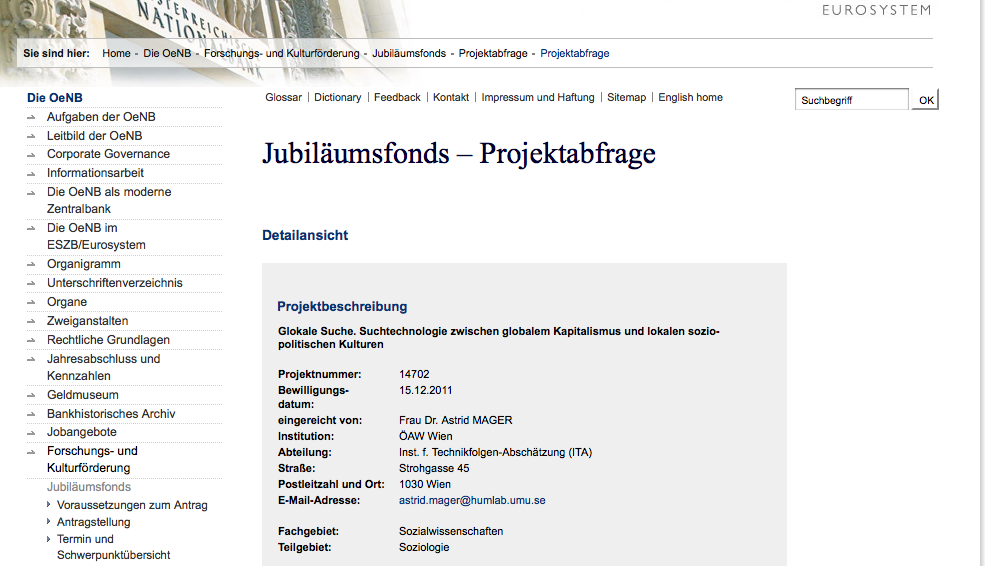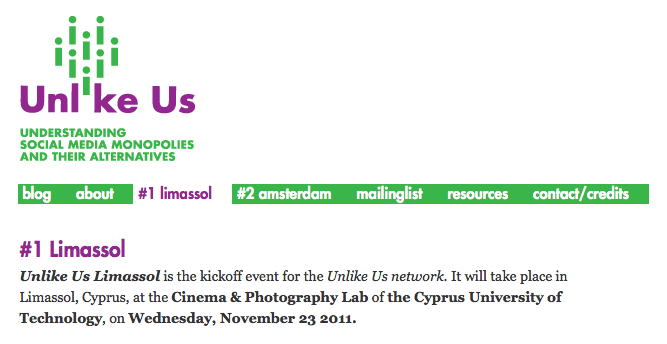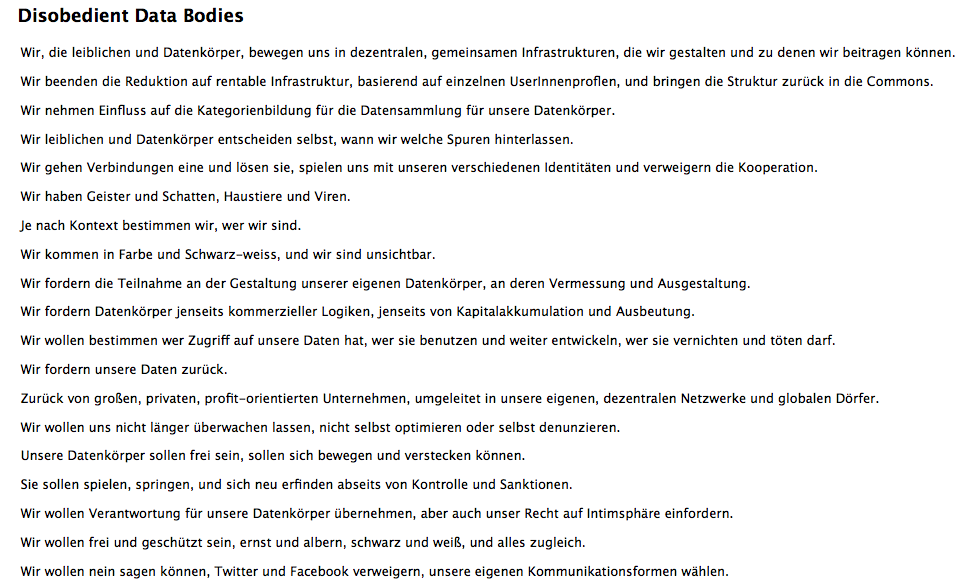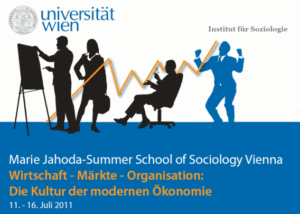Just before xmas I got the great great news that my 2-year research project “Glocal Search. Search technology at the intersection of global capitalism and local socio-political cultures” got funded by the Österreichische Nationalbank (OeNB). YAY. I’m really looking forward to 2012 now, where I’ll be in Vienna again!!!!! More information to follow.. stay tuned!
Tag Archives: market capitalism
goodtosee #10: unlike us & disobedient data bodies
A new network initiative has been circulated in mailing lists over the past couple of days. It’s called “Unlike Us. Understanding social media monopolies and their alternatives” (Concept: Geert Lovink (Institute of Network Cultures/HvA, Amsterdam) and Korinna Patelis (Cyprus University of Technology, Limassol). Its critical approach to social media definitely deserves a #goodtosee blog post! The central aim of the initiative is to establish a network of artists, designers, scholars, activists and programmers who work on ‘alternatives in social media’. Planned are a series of events, a reader, workshops, online debates, campaigns etc. By pursuing these initiatives Unlike Us intends to both analyze the economic and cultural aspects of dominant social media platforms and to propagate the further development and proliferation of alternative, decentralized social media software, as may be read on its website. In doing so it wants to go beyond the culture of complaint and ask overarching questions about how to tackle fast-emerging monopoly powers:
Without falling into the romantic trap of some harmonious offline life, Unlike Us asks what sort of network architectures could be designed that contribute to ‘the common’, understood as a shared resource and system of collective production that supports new forms of social organizations (such as organized networks) without mining for data to sell. What aesthetic tactics could effectively end the expropriation of subjective and private dimensions that we experience daily in social networks? Why do we ignore networks that refuse the (hyper)growth model and instead seek to strengthen forms of free cooperation? Turning the tables, let’s code and develop other ‘network cultures’ whose protocols are no longer related to the logic of ‘weak ties’. What type of social relations do we want to foster and discover in the 21st century? Imagine dense, diverse networked exchanges between billions of people, outside corporate and state control. Imagine discourses returning subjectivities to their ‘natural’ status as open nodes based on dialogue and an ethics of free exchange.
The kick-off event will take place in Limassol (Cyprus) and focuses on how the facilitation of free exchanges and the commercial exploitation of social relationships, which lie at the heart of contemporary capitalism, belly social media (23 November 2011). For more infos on the kick-off meeting go to this page or subscribe to their mailing list.
I’m really happy to see a more critical approach to social media and will most certainly follow their activities! The questions they pose are highly relevant in an age of monopolist, for-profit internet technologies and go far beyond social media. Similar claims could – and should – be made about search engines, as I discussed in my recent article “Algorithmic Ideology“. The initiative Unlike Us further nicely relates to discussions we had at the Symposium Knowledge Machines between Freedom & Control in Hainburg (see also this blog post), where we arrived at similar questions and the need to think about and work on alternative technologies accountable to “the common” rather than monopolist companies making profit with our content and data. If you feel the urge to articulate your discomfort and complaints about Facebook, Google & co. and their privacy policy & business models you are more than welcome to contribute to the manifesto we created as part of the Hainburg event. It’s titled “Disobedient Data Bodies” and may be found here. Enjoy reading it, sharing it, continuing it, or adding some fancy background image since it’s still a little plain & white for a manifesto, as you can see below 😉 – both German & English texts are welcome!
Upcoming travels and events
Tomorrow morning I’ll go to Oxford to participate in the OII conference “A Decade in Internet Time“. The line-up of speakers looks very promising and includes big names such as Manuel Castells, Ted Nelson, Danah Boyd, and others. I’m looking forward to present and discuss my paper “Algorithmic Ideology” in this great intellectual enviroment. That’s the abstract of my talk:
This article investigates how the “new spirit of capitalism” (Boltanski & Chiapello, 2007) gets inscribed in the fabric of search algorithms by way of social practices. Drawing on the tradition of the social construction of technology (SCOT) and 17 qualitative expert interviews I discuss how search engines and their “capital accumulation cycle” (Fuchs, forthcoming) are negotiated and stabilized in a network of actors and interests, website providers and users first and foremost. I further show how corporate search engines and their capitalist ideology are solidified in a socio-political context characterized by a techno-euphoric climate of innovation and a politics of privatization. This analysis provides a valuable contribution to contemporary search engine critique mainly focusing on search engines’ business models and societal implications. It shows that a shift of perspective is needed from impacts search engines have on society towards social practices and power relations involved in the construction of search engines to reconsider and renegotiate search engines and their algorithmic ideology in the future.
The full paper could be downloaded here. After the OII conference I’ll take part in the workshop Social Media Cultures, which will take place at HUMlab right after (26-28 September). It’s a joint workshop of researches from the Umeå University and the University of Wollongong/ Australia. Thanks to Jim Barrett for organizing this event!
On the 5th of October I’ll go back to Austria to join the symposium “Knowledge Machines between Freedom and Control” in Hainburg, which is organized by IMA, Institut for Media Archeology, in cooperation with Theo Röhle. It’s the final event of the exhibition “insight-Tower – A World Machine“, where you can “stick your head into the net” (concept: Seppo Gründler, Nicole Pruckermayr, Elisabeth Schimana, Martin Schitter):
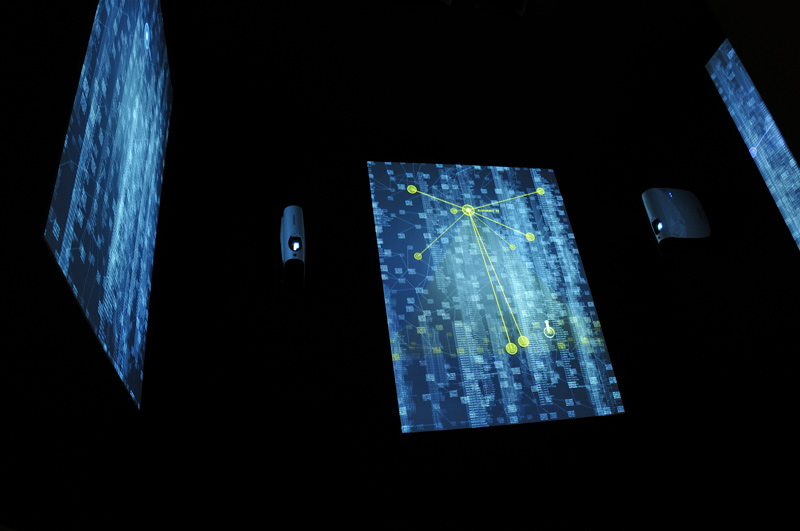 © photo credit IMA
© photo credit IMA
The symposium aims at initiating a discourse on search engines between researchers, technicians and artists and closes with a public event, which seems exciting to me! From Vienna I’ll most probably go to the inauguration symposium of the new research institute “Internet and Society” in Berlin (25-28 October). Since the institute is financed by Google and renowed German Universities have started to collaborate with them I expect it to be a truly interesting conference/ workshop (some of the details are still fuzzy though).
Finally, in November, I’ve been invited to participate in the workshop “Studying digital cultures – tools and methods for Humanities scholars” in Lund; organized by Lund University’s Humanities Laboratory, the Humanities Experiment Group (HEX), and the Department of Arts and Cultural Sciences (24 November). I’m already looking forward to seeing Jutta Haider, Olof Sundin & Karolina Lindh again, who made my last stay in “the south of Sweden” incredibly enjoyable!! Finally, in December, there will be another HUMlab conference called “The Internet of Things”, more infos will follow!
In between all these exciting events I hope I’ll get some writing done, another grant proposal out, and to pursue my research project on the biofuel controversy in Swedish media and search engine results (together with Jenny Eklöf), a project I’m really looking forward to!! 🙂 We’ll present our work at the beginning of November as part of the Umeå Studies in Science, Technology and Environment seminar series. Stay tuned!
summer school season 2011
I’m excited about the summer school season that’s starting soon! My first stop will be Amsterdam, where the Digital Methods Summer School is taking place from the 27 June till the 8 July. It will be fun to meet Richard Rogers, the organizer of the summer school, and his team again and share ideas, empirical insights, and “digital tools”. The program looks amazing and there’s going to be a great number of participants from all over the world (see also this blogpost).
My second stop will be Vienna, where I’ll attend the Marie Jahoda Summer School of Sociology dealing with Economy–Markets–Organizations: The Culture of modern Economy.
That’s an excerpt from the website:
Like all economic processes, markets and organizations are embedded in social structures. Cultural values and political decisions strongly influence economic action, and economic processes follow social norms. The culture of markets transcends the homo oeconomicus. As the new economic sociology has shown, economic action, whether it takes place on markets, in organizations, in networks or as self-management, has to be understood as multi-dimensional and is not bound to an economic rationality existing outside social relations. In this perspective, current processes like the “economization” of social fields become themselves visible as cultural patterns of social organization.
The Marie Jahoda Summer School of Sociology will be set against this thematic background. We will examine competition, firms, management practices and organizations in the economic field, extending it to the arts, religion, sports, fashion, pop culture or the media – social fields, which themselves are examples of today’s “culture of markets”.
It will be really interesting to go back to the Sociology Department, where I studied more than 10 years ago! I’m sure a lot has changed in the last decade and I’m curious about the current state of the field. There will be 19 participants, mostly from the German-speaking context, and I’m happy to be one of them. The summer school will be an excellent opportunity to present my work on search engines in the context of present-day market capitalism and gain feed-back from Austrian/ German researchers. I’m particularly looking forward to meeting Sighard Neckel, the organizer of the summer school – who kindly invited me to take part in this event – and his collaborators.

